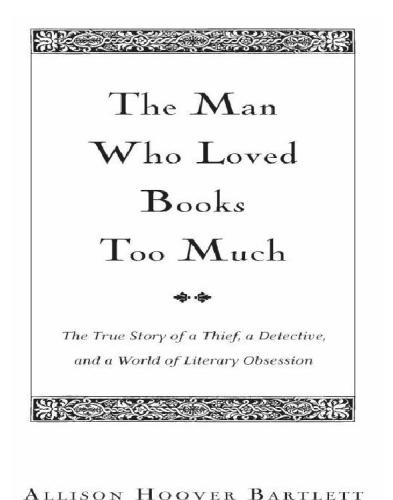
The Man Who Loved Books Too Much
The True Story of a Thief, a Detective, and a World of Literary Obsession
کتاب های مرتبط
- اطلاعات
- نقد و بررسی
- دیدگاه کاربران
نقد و بررسی

July 27, 2009
Bartlett delves into the world of rare books and those who collect—and steal—them with mixed results. On one end of the spectrum is Salt Lake City book dealer Ken Sanders, whose friends refer to him as a book detective, or “Bibliodick.” On the other end is John Gilkey, who has stolen over $100,000 worth of rare volumes, mostly in California. A lifelong book lover, Gilkey's passion for rare texts always exceeded his income, and he began using stolen credit card numbers to purchase, among others, first editions of Beatrix Potter and Mark Twain from reputable dealers. Sanders, the Antiquarian Booksellers' Association's security chair, began compiling complaints from ripped-off dealers and became obsessed with bringing Gilkey to justice. Bartlett's journalistic position is enviable: both men provided her almost unfettered access to their respective worlds. Gilkey recounted his past triumphs in great detail, while Bartlett's interactions with the unrepentant, selfish but oddly charming Gilkey are revealing (her original article about himself appeared in The Best Crime Reporting 2007
). Here, however, she struggles to weave it all into a cohesive narrative.

July 1, 2009
A Janet Malcolm–style reflection on the ramifications of a reporter's interaction with a criminal, in this case one with a bibliomania shared by the antiquarian book dealer pursuing him.
Over four years, John Charles Gilkey pilfered hundreds of thousands of dollars worth of rare books, often with credit-card numbers obtained from his part-time job at Saks Fifth Avenue. As freelance journalist Bartlett points out, antiquarian-book theft occurs more frequently than that of fine art. Rather than advertise a theft that would inflame fears of lax security, dealers often prefer to stay quiet about losses. Gilkey's passion—but not his larcenous instinct—was shared by Ken Sanders, a rare-book dealer and volunteer security chair of the Antiquarian Booksellers' Association of America, who doggedly tracked the con man, sometimes at the expense of his own business. Sanders is part of a profession often composed of obsessives who do the work as a labor of love, barely making ends meet. Though she misses a few aspects of the business—e.g., does the Internet secure or tighten dealers' control over their collections?—Bartlett is adept at explaining the mindset required for this trade. But as she interviews Gilkey and accompanies him on a few of his rounds, she finds herself asking questions about her project. Is she giving this narcissist attention that his crimes don't merit? Is she responsible for reporting his crimes to police and unsuspecting book dealers? Many readers will disagree that Gilkey had"come to seem a happy man with goals, ambition, and some measure of success," while supporting the opposite conclusion, that he was"greedy, selfish, criminal."
Not only a"cautionary tale for those who plan to deal in rare books in the future," but a demonstration of how a seasoned reporter can disregard the ethics of objectivity.
(COPYRIGHT (2009) KIRKUS REVIEWS/NIELSEN BUSINESS MEDIA, INC. ALL RIGHTS RESERVED.)

Starred review from September 1, 2009
Rare bookstore owner Ken Saunders relishes catching book thieves, and his favorite target is John Gilkey, a repeat offender who has spent multiple stints in jail for using stolen credit card numbers and bad checks to purchase books estimated to be worth together more than $100,000. In this intriguing account, journalist Bartlett takes readers behind the scenes at antiquarian book fairs and rare bookstores, where sellers are always on the lookout for thieves. Bartlett first meets Gilkey when he is serving time near San Francisco. Over several meetings, Gilkey explains that he feels he builds his image through books, proving himself a man of taste, knowledge, and affluence. VERDICT This excellent tale of people's intimate, complex, and sometimes dangerous relationships to books will be relished by readers, writers, and collectors who are passionate about books as well as fans of true crime stories. [See Prepub Alert, "LJ" 5/1/09.]Joyce Sparrow, JWB Children's Svcs. Council, Clearwater, FL
Copyright 2009 Library Journal, LLC Used with permission.

September 1, 2009
As the new millennium got underway, John Gilkey began to steal thousands of dollars worth of irreplaceable rare and valuable books from libraries, museums, and dealers across the U.S. Brought up in a household that collected books as ardently as it committed petty crimes, Gilkey began his acquisitions by any means possible. As Bartlett discovers, book theft is a widespread crime that respects no borders. Moreover, the rare-book business has always had more than a whiff of impropriety, if not actual dishonesty, about it. Bartlett establishes links with Gilkey, whose crimes have landed him in prison and who is apparently eager to have his exploits immortalized in print. She also encounters Ken Sanders, a book dealer obsessed with apprehending Gilkey. This is a grand morality tale in which books as objects become perversely more important than the ideas contained within.(Reprinted with permission of Booklist, copyright 2009, American Library Association.)

























دیدگاه کاربران